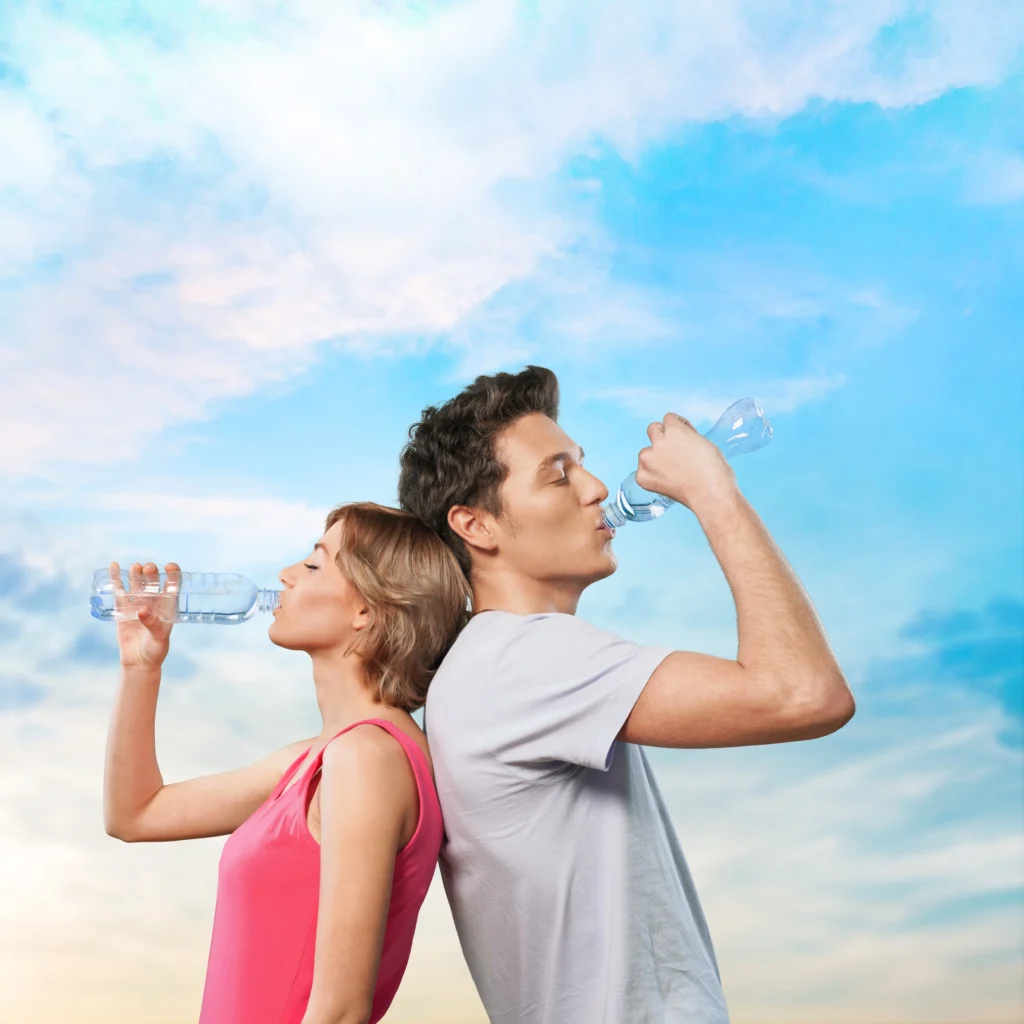Estimated Reading Time: 10-12 minutes (2,024 words)
Introduction
When it comes to maintaining health and wellness, we often focus on exercise, diet, and sleep. But one fundamental aspect of well-being is often overlooked: hydration. We all know that drinking water is essential for survival, but do we truly understand how profoundly water impacts our health and well-being?Water makes up about 60% of our body and is involved in virtually every biological process. Whether it’s regulating body temperature, aiding digestion, or supporting cognitive function, water plays a crucial role in ensuring our bodies function optimally. In this blog, we will explore the importance of hydration, how water impacts physical health, mental performance, and overall wellness, and why staying properly hydrated is essential for leading a healthy life.
Water is not just a drink; it’s a powerful tool that fuels every cell in your body—improving your health, boosting energy, and enhancing your cognitive performance.
Many of us don’t drink enough water, with studies showing that 75% of people are chronically dehydrated. This can lead to a wide array of health problems, including fatigue, poor digestion, headaches, and decreased mental clarity. Dehydration can also affect physical performance, making it harder to stay active and focused.
Despite its importance, water often takes a backseat to other wellness practices. As we move further into 2025, it’s crucial to prioritize proper hydration for optimal health. This blog will uncover the benefits of staying hydrated, the risks of dehydration, and how to ensure you’re getting enough water to thrive.
In this blog, we’ll break down why hydration is essential for your body’s performance, how it affects your mental health, and offer actionable tips on how to hydrate effectively. We’ll also dive into the science behind hydration, explain how much water you should be drinking daily, and tackle the myths and misconceptions surrounding hydration.

Why Hydration is Crucial for Your Health
Water is involved in numerous vital processes, and staying hydrated helps maintain balance in your body. Here’s why hydration is so critical:
1. Regulates Body Temperature
Water helps regulate body temperature through sweating and evaporation, preventing overheating, especially during physical activity or hot weather.
2. Supports Digestion and Nutrient Absorption
Water aids in the digestion process and helps transport nutrients and waste through the body. It is also necessary for the absorption of certain vitamins and minerals, such as fat-soluble vitamins (A, D, E, K).
3. Enhances Detoxification
Water is essential for the kidneys to remove waste from the body through urination. Proper hydration supports efficient detoxification by flushing out harmful toxins and by-products of metabolism.
The Role of Water in Physical Health
Proper hydration is fundamental to maintaining optimal physical health and ensuring your body operates at its best. Here’s how water influences different aspects of physical wellness:
1. Enhances Physical Performance
When you’re hydrated, your muscles function optimally, reducing the risk of cramps and fatigue. Dehydration can lead to decreased endurance, impaired strength, and increased perceived effort during exercise.
- Example: Research published by the National Institutes of Health (NIH) shows that even a 2% loss of body weight through dehydration can significantly affect exercise performance.
2. Boosts Immune Function
Water helps maintain the function of the lymphatic system, which is crucial for immune function. Proper hydration ensures that immune cells can circulate efficiently to detect and respond to infections.
3. Maintains Healthy Skin
Dehydration can cause your skin to appear dry, flaky, and wrinkled. Drinking enough water helps maintain skin elasticity and hydration, contributing to a more youthful, radiant complexion.
The Impact of Hydration on Mental Clarity and Cognitive Function
Water is essential not only for physical health but also for mental well-being. Here’s how hydration affects cognitive function:
1. Improves Concentration and Focus
Proper hydration helps keep your brain alert and improves your ability to concentrate and focus. Dehydration can lead to brain fog, difficulty concentrating, and a reduction in mental clarity.
2. Enhances Memory and Learning
Studies have shown that staying hydrated can improve short-term memory and learning capacity. Water supports the neurotransmitters and synapses that enable memory and cognitive function.
- Example: A study conducted by the University of East London found that hydrated individuals performed better on cognitive tasks than those who were dehydrated.
3. Boosts Mood and Reduces Stress
Dehydration can contribute to irritability, anxiety, and stress. On the other hand, staying hydrated helps maintain emotional stability and boosts overall mood.

How Dehydration Affects Your Body and Performance
Dehydration can have profound negative effects on both physical and mental performance. Even mild dehydration can result in:
- Fatigue and low energy levels
- Dizziness or light-headedness
- Headaches and migraines
- Poor digestion and constipation
- Decreased ability to regulate body temperature
Chronic dehydration may also contribute to more serious health issues, including kidney stones, urinary tract infections, and even heat stroke.
How Much Water Should You Drink Daily?
There is no one-size-fits-all answer to how much water you should drink, as it depends on factors such as age, weight, activity level, and environmental conditions. However, a general guideline is:
- Men: About 3.7 liters (125 ounces) of total water intake from all beverages and foods per day.
- Women: About 2.7 liters (91 ounces) of total water intake per day.
If you’re physically active, you may need to drink more water to replace fluids lost through sweat.
Hydration Tips and Tricks for Better Wellness
- Carry a Water Bottle: Keep a reusable water bottle with you throughout the day to remind yourself to drink water regularly.
- Add Flavor: If you struggle with plain water, try adding a slice of lemon, lime, or cucumber for extra flavor and nutrients.
- Drink Water Before Meals: Drinking a glass of water before meals can help you stay hydrated and may also help with portion control.
Drink Electrolyte-Rich Water: If you’re exercising or sweating heavily, consider drinking water enriched with electrolytes to replenish minerals like sodium, potassium, and magnesium.
Key Facts & Statistics Box
- 75% of people are chronically dehydrated, and 1 in 3 adults don’t drink enough water daily (Source: NIH).
- Dehydration can reduce physical performance by up to 20% (Source: Journal of Strength and Conditioning Research).
Drinking 8 glasses of water a day is a general guideline, but hydration needs vary by individual factors like age, activity level, and climate (Source: Mayo Clinic).
FAQs Section
1. How much water should I drink per day?
The amount of water you need depends on several factors, such as age, sex, activity level, and the climate you live in. However, a general guideline is:
- Men: About 3.7 liters (125 ounces) of total water intake from all beverages and foods per day.
- Women: About 2.7 liters (91 ounces) of total water intake per day.
This is a general guideline, and you may need more if you are physically active, pregnant, or live in a hot climate.
2. Can I hydrate with beverages other than water?
Yes! While water is the best source of hydration, other beverages like herbal teas, milk, fruit juices, and coconut water also contribute to hydration. However, it’s important to be mindful of sugary or caffeinated drinks, as they may dehydrate the body if consumed in excess. Be sure to balance these with water for optimal hydration.
3. Is it possible to drink too much water?
Yes, it is possible to drink too much water, leading to a condition called hyponatremia or water intoxication. This occurs when the body’s sodium levels become dangerously diluted, causing swelling in the cells. While rare, it’s essential to listen to your body and avoid excessive water consumption beyond what your body requires.
4. What are the symptoms of dehydration?
Dehydration can manifest in various ways. Some common symptoms include:
- Thirst and dry mouth
- Fatigue and tiredness
- Headaches or dizziness
- Dark-colored urine or infrequent urination
- Dry skin and reduced skin elasticity
- Confusion or difficulty concentrating
If you experience any of these symptoms, it’s essential to drink water immediately and rehydrate.
5. How can I improve my hydration if I don’t like the taste of water?
If you find plain water unappealing, you can:
- Infuse water with fruits, vegetables, or herbs (like lemon, cucumber, or mint) for added flavor.
- Drink flavored water or herbal teas that don’t contain added sugars.
- Eat water-rich foods like cucumbers, watermelon, strawberries, and oranges, which help you stay hydrated.
6. Does drinking water help with weight loss?
Yes, drinking water can support weight loss in several ways:
- Appetite control: Drinking water before meals can help control hunger and reduce the number of calories consumed.
- Increased metabolism: Drinking cold water can temporarily boost metabolism as the body works to warm the water to body temperature.
- Reduces calorie consumption: Replacing sugary drinks with water reduces overall calorie intake.
7. Can dehydration affect my sleep?
Yes, dehydration can impact your sleep quality. When dehydrated, your body may become more restless, leading to difficulty falling asleep or staying asleep. Inadequate hydration also increases the likelihood of waking up with dry mouth and headaches, which disrupt sleep.
8. How does water help with digestion?
Water is essential for digestive health. It helps break down food so that your body can absorb nutrients and prevent constipation. Drinking enough water ensures that the digestive enzymes and stomach acids function properly. Water also aids in the movement of food through the intestines, helping to keep bowel movements regular.
9. How can I stay hydrated during exercise?
During exercise, your body loses water through sweat, so it’s important to replenish fluids:
- Drink water before, during, and after exercise.
- For longer or more intense workouts, consider drinking electrolyte-rich beverages (like sports drinks or coconut water) to replace lost minerals.
- Monitor your urine color: If it’s light yellow, you’re likely well-hydrated. Dark urine is a sign that you need more water.
10. What are the benefits of drinking water first thing in the morning?
Drinking water first thing in the morning helps:
- Rehydrate your body after hours of sleep.
- Boost metabolism and kick-start digestion.
- Flush out toxins that accumulate overnight through the kidneys.
- Increase energy levels and improve cognitive function throughout the day.
Drinking water in the morning is a great way to ensure you’re starting the day off on the right foot.

Summary & Key Takeaways
Hydration is one of the most vital — yet most overlooked — pillars of overall wellness. Water makes up around 60% of the human body and is essential for nearly every function, from regulating body temperature and aiding digestion to supporting brain activity and detoxification. Despite this, research shows that around 75% of people are chronically dehydrated, leading to fatigue, headaches, low mood, and reduced physical and cognitive performance.
Even a 2% drop in body water can impact focus, memory, and exercise endurance. Staying hydrated enhances physical performance, boosts immune function, and keeps skin healthy and radiant. It also supports emotional well-being by reducing stress and irritability. The general guideline is 3.7 liters of total water intake for men and 2.7 liters for women, though needs vary depending on activity, age, and climate.
Proper hydration habits — such as drinking water before meals, carrying a reusable bottle, or infusing water with fruits and herbs — make it easier to maintain balance. Including water-rich foods like watermelon, cucumber, and oranges can further boost hydration. Morning hydration, in particular, helps kickstart metabolism and flush overnight toxins.
In short, water fuels every cell in your body, improving energy, cognition, immunity, and longevity. By making hydration a daily priority, you lay the foundation for lasting health, sharper focus, and improved overall wellness.
Conclusion
Proper hydration is fundamental to maintaining optimal health and wellness. From improving mental clarity to enhancing physical performance, water is an essential component of our daily lives. In 2025, as we become more aware of the benefits of staying hydrated, we must make hydration a priority in our health routines.
References & Sources
These are reliable, research-backed sources that align with or support the facts presented in the blog:
- National Institutes of Health (NIH) – “Water, Hydration, and Health.” Nutrition Reviews.
https://www.ncbi.nlm.nih.gov/pmc/articles/PMC2908954/
→ Details how hydration affects metabolism, cognition, and physical performance. - Mayo Clinic – “How Much Water Do You Need to Stay Healthy?”
https://www.mayoclinic.org/healthy-lifestyle/nutrition-and-healthy-eating/in-depth/water/art-20044256
→ Provides daily hydration guidelines by gender and lifestyle. - Journal of Strength and Conditioning Research (2019) – “Effects of Dehydration on Exercise Performance.”
https://journals.lww.com/nsca-jscr
→ Found that dehydration can decrease endurance and muscle performance by up to 20%. - University of East London Study (2013) – “The Effect of Water on Cognitive Performance and Mood.”
https://pubmed.ncbi.nlm.nih.gov/23881904/
→ Demonstrated measurable improvements in focus and mood with hydration. - Centers for Disease Control and Prevention (CDC) – “Get the Facts: Drinking Water and Your Health.”
https://www.cdc.gov/healthywater/drinking/nutrition/index.html
→ Discusses hydration’s role in digestion, detoxification, and thermoregulation. - Harvard T.H. Chan School of Public Health – “The Importance of Staying Hydrated.”
https://www.hsph.harvard.edu/nutritionsource/water/
→ Covers hydration’s effects on mood, cognition, and long-term health.







